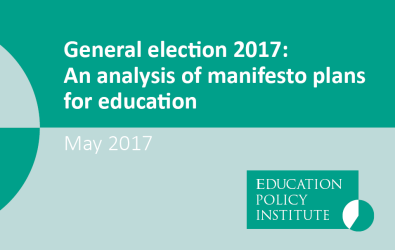The Education Policy Institute (EPI), funded by the Nuffield Foundation, has carried out an analysis of the manifesto education plans of the five main parties – the Conservative, Labour, Liberal Democrat, Green and Brexit parties.
EPI researchers have assessed each party’s education policies, considering the extent to which they are based on research evidence and whether and how they are likely to impact on overall attainment and the gaps between more vulnerable children and the rest.
You can download the full report here.
Where possible, we have compared each party’s spending commitments with our own estimates of likely costs. We have not attempted to analyse in any detail the credibility of the revenue assumptions which underlie the education spending commitments.
Overall conclusions:
- Although all parties have made bold pledges about reducing opportunity gaps and raising educational attainment, the policies in their manifestos are unlikely to deliver on these aspirations.
- Despite a large proportion of the attainment gap between poor children and the rest emerging before entry to school, party policies seem to focus on improving childcare for employment and cost of living reasons, rather than focusing on high quality early years education. While Labour and the Liberal Democrats are making major funding commitments in this area, there are serious questions about whether their policies can be delivered effectively and secure high quality and value for money over the limited implementation periods envisaged. The Conservatives give no indication of whether they will take action to improve the quality and progressiveness of early years entitlements.
- All major parties are pledging additional funding for schools, colleges and special needs education– with Labour and the Greens committing to the biggest increases. This could help to deliver effective interventions and may improve teacher retention. But under Conservative policies, there will be a relative shift in funding away from schools with higher levels of disadvantage – and this attempt to “level up funding” could widen the disadvantage gaps in attainment. Both Labour and the Liberal Democrats may have under-estimated the cost of their policies on free school meals, and this could require funding to be diverted from other parts of the schools budget.
- Large policy differences have opened up between the parties over school inspection, school testing and performance tables. The current system of accountability is in need of improvement, but education research suggests that Labour and Liberal Democrat plans to scrap primary tests and move to lower stakes inspection could damage attainment, and might particularly pose a risk to improving outcomes for the most vulnerable learners.The Conservatives do not commit to improving the current system or addressing any of its negative incentives and impacts.
- Party policies on post 18 education are particularly disappointing. Labour proposes that its most expensive education policy should be allocating around £7bn to scrap university tuition fees, even though this may not improve participation, or the access of vulnerable groups. The Conservatives offer few policies on higher education, and the one concrete measure (reduced interest rates on student loans) would disproportionately benefit higher earners. The Liberal Democrats appear to be offering a similar “Review” to those included in their two previous manifestos.
- While all parties are committed to additional education funding over the years ahead, there is a high level of uncertainty about the revenues which have been earmarked for such funding.The Conservative plans assume that the growth impact of Brexit will be moderate; the Labour plans assume the same, and also rely upon large tax revenues from a limited number of sources; meanwhile, the Liberal Democrats are banking on a “Remain Bonus”, and revenues from uncertain sources such as tax avoidance. With all parties, it is unclear how education spending plans would be altered if revenues prove less robust than planned.
Commenting on the launch of the new analysis, Natalie Perera, Executive Director and Head of Research at the Education Policy Institute, said:
“All of the main parties are united by one thing – bold ambitions to raise attainment and close gaps. However, our analysis shows that while each party has some well-designed and helpful policies, none has a properly evidence-based strategy to meet their ambitions. In order to address the inequality gap at age 16, parties should commit to policies which build on the evidence of what works, which includes high quality early years education and ensuring that children in the most disadvantaged schools have access to the best teachers.”
Jon Andrews, Deputy Head of Research and the report’s lead author, said:
“EPI’s analysis highlights that no party has produced a robust, evidence based, set of policies across the board which would be likely to significantly increase attainment and reduce the current, large disadvantaged gaps.
“School accountability provides one of the clear dividing lines in education policy between the main parties. The current system has flaws. It tends to favour schools in the most affluent areas and can work against the most vulnerable pupils. But a willingness to address these specific challenges is largely lacking in the manifestos and the major opposition parties suggest instead a significant watering down of existing accountability, including abolishing Ofsted. The Conservatives propose continuing with current policy. Neither approach is likely to improve pupil outcomes.
“All of the parties have proposed significant extra spending, but people shouldn’t simply be blinded by the large numbers in the manifestos. In practice, the Conservative plans mean that as many as half of disadvantaged secondary schools will not be seeing real terms increases in funding next year. Labour’s largest funding pledge – to abolish university tuition fees will be of no benefit to attainment or reducing the disadvantage gap. And while the Liberal Democrats are making a strikingly large commitment to extra early years funding, it is highly unlikely that a spending boost of this size could deliver value for money over the shorter term.”
You can download the full analysis here.



